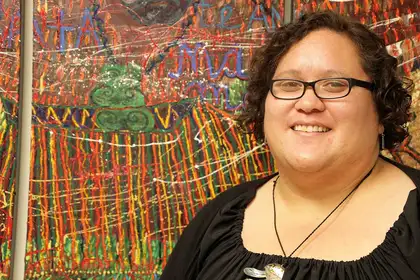
Dr Krushil Watene.
Dr Krushil Watene, Ngāti Whātua, Ngāpuhi, has some big questions on her mind – questions she thinks could help change the way we live together as a society.
The Massey University philosopher is at the start of a three-year study into how Māori and other indigenous perspectives can have a stronger voice in discussions around social and global justice.
Current ‘mainstream’ western theories of justice often don’t consider indigenous perspectives and this new study aims to introduce Māori concepts such as whakapapa, mana and manaakitanga into international scholarly discussion and to empower indigenous communities.
The project funded with a $300,000 Marsden grant will explore some fundamental questions like, what does it mean to do philosophy in a Māori way?
Dr Watene says mainstream philosophy study would usually involve reading what’s been written on a subject, thinking about that material and then writing something else. But she says an indigenous philosopher also needs to be engaged and open to the changing nature of concepts within communities. “The research locates itself within Tai Tokerau, so I engage with the writings and scholarship attached to those communities. I also have a small group of experts guiding the research.”
Dr Watene says an important part of the study will be the kōrero that takes place, and generally the co-creation of knowledge. “It’s about bringing people together and showing how concepts and ideas can flourish through korero and reflection.”
While Greek philosophers such as Plato are usually credited as the forefathers of philosophy, Dr Watene says Māori have always had their own philosophers. “All societies have thinkers, knowledge keepers, people who are able to think about these deep questions and then most importantly I think, show us how they can provide guidance for our lives and our world.”
While the first part of the study will articulate Māori concepts, the second part will bring those ideas into conversation with indigenous North American, African and also ‘mainstream’ western conceptions of justice. “I’m looking to create space for a conversation across cultures about what social justice looks like, not just in New Zealand but also globally.”
In August, Dr Watene will co-host a Diversity in Philosophy symposium at Massey University with Kristie Dotson of Michigan State University (MSU), which will bring philosophers from MSU into conversation with Māori and Pacific philosophers. Then in September she will travel to South Africa to facilitate an African philosophy event in Cape Town that explores Ubuntu (a humanist African philosophy) with local philosophers. Next year, Dr Watene will co-organise with Kyle Whyte a conversation between Māori and indigenous North American concepts.
“When I was involved in the Ngāti Whātua Ōrākei whānau ora research project, Aunty Mere Tipene explained that Whānau Ora is about collecting the embers that are surviving on their own and bringing them together to create a fire once more,” she says. “I’ve never forgotten this, and I think that this is what the Marsden grant and my interest in diversifying philosophy is largely about – acknowledging local philosophies and bringing them together to create something meaningful. To create something that can have an impact on both the landscape of philosophy and the lives of local people.”